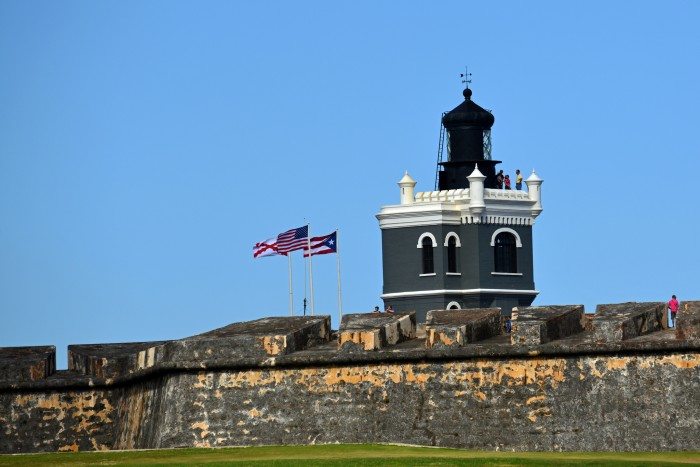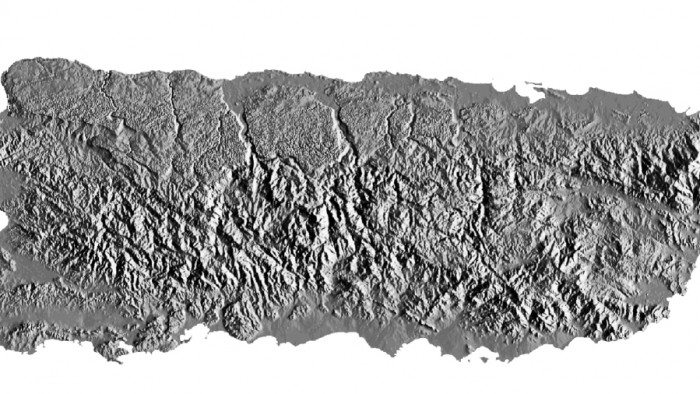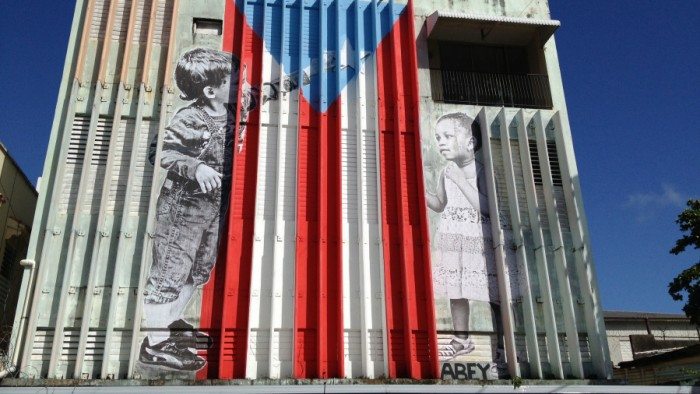

Castillo San Felipe del Morro, the 16th-century citadel overlooking San Juan Bay in Puerto Rico (Harvey Barrison/Flickr)
The island of Puerto Rico is crumbling, crushed underneath an overwhelming $70 billion debt.
How did it come to this?
The answer lies in the indecisive nature of the political and territorial status of the island of Puerto Rico. For the entire 118 year occupation of the island, Congress has bestowed onto the people American citizenship and the right to self-governance. none of these institutions has been respected.
Rather than respect these institutions, the government of the United States has granted Congress the authority to be the sole purveyor of Puerto Rican sovereignty. This is an issue. The people of Puerto Rico demand and deserve better treatment than has been received for the past century.
The unpayable debt was placed into the hands of a federal oversight board whose members were appointed by President Barack Obama with nominations from both Republican and Democratic leaders. The new proposal to provide relief for the island, the Puerto Rico Oversight, Management and Economic Stability Act (PROMESA) was passed and levied against the people.
Congress “rescued” Puerto Rico from an economic crisis. The unelected, “independent,” federal oversight board has control of the island’s finances, promising financial stability and economic growth, with an emphasis on financial reform. Despite the appearance of victory, Puerto Rico did not win.


The federal oversight board has far-reaching powers that diminish the impact of local government. It is an institution whose creation has not been well-received. This is for good reason. The powers granted to the board are unprecedented, stripping from Puerto Rico what little autonomy existed. Many on the island do not want the legislation. This is evident.
Disapproval of PROMESA has fallen on deaf ears, as the legislation is hailed as a “saving grace.” Why should such legislation, passed at the last-minute, be seen as a saving grace? Congress has known about the economic and fiscal difficulties that plague Puerto Rico for quite some time, yet now was the time to act?
PROMESA did not offer solutions to the economic crisis: it is delaying the inevitable and preserving dependent status. The legislation does little in helping encourage economic growth, instead preaching financial responsibility. As always, the focus continues to be on trimming the deficit, in an effort to payback “predatory” hedge-funds.
Austerity, as a means to line pockets, is immoral. The “>vultures” must be held accountable. Calls to raise taxes, cut education spending and other measures do nothing in terms of alleviating the debt burden. The exploitative practices increase profits, and further burden the people of Puerto Rico.
Hedge funds long for the situation in Puerto Rico. A 1984 congressional amendment prevents municipalities in Puerto Rico from accessing the benefits of Chapter 9 bankruptcy. As a result, Puerto Rico must deal with lenders on an individual basis. The hedge funds were willing to pay, as municipal bonds were purchased at 30%-50% of par value. As the inevitable occurred, and Puerto Rico was unable to pay back such lenders, drastic measures were instituted that placed the needs of hedge-fund managers, above the people of Puerto Rico.
The healthcare system, for example, has suffered. Cuts in Medicare and Medicaid are prime examples. The beginnings of a humanitarian crisis appear imminent, as Zika cases soar.
The healthcare system in Puerto Rico is not capable of an epidemic that has seen more than 5,500 people infected, as of July 2016. According to the Center of Disease Control and Prevention (CDC), nearly a quarter of Puerto Rico’s population may be infected by year’s end.
Puerto Rico does not have the infrastructure needed to help combat the disease. This is what makes the allocation of funding all the more important. However, not much has been done, as political gridlock in Washington impedes progress.
The disease has overwhelmed the people of Puerto Rico. The debt crisis has exacerbated the issue. Funding that may otherwise go to help combat the virus, has instead been earmarked to help alleviate the mounting debt.
Cuts to public education and healthcare are detrimental. The island has 40% fewer students, 10% more teachers, with a 39% increase in spending. So why would cuts to public education be so harmful? It seems like a logical step, the 39% increase in spending, with a significant decrease in enrollment warrants reconsideration.
However, it is also important to note that the Puerto Rican poverty level is at 44%. Since 2005, the population of Puerto Rico has dropped 9% (Michigan, at a rate of -1.3%, is the closest, followed by Rhode Island at -1.1%). The migration to the mainland has been significant; the result of stagnant economic conditions forcing people to seek opportunities elsewhere.


Why is this significant? It does not condone the mismanagement, and irresponsible spending and borrowing practices, but it accentuates them. It vilifies expenditures in education that are beneficial to students, many of whom, are in need.
Austerity measures expose the realities of mismanagement, but all too often, the people who were intended to be the beneficiaries of “wasteful” programs, suffer most from their implementation.
As funds for education are cut, the people become the victims, forced to accept their fate as uneducated, unskilled laborers (a July unemployment rate of 11.4%, makes finding work improbable). The minimum wage, to be set at 4.25, further compounds problems, as the lack of education of workers, provides the justification for such a low number.
Cngress has dragged their feet, as the people of Puerto Rico continue to suffer. The people have protested, but still, nothing has been done. A lawsuit against the governor of Puerto Rico, Alejandro García Padilla, is a sign of the troubling times ahead.
Calls for statehood seem perpetual. Calls for independence draw the same attention. These proposals, while tempting, do not solve the larger problem. Statehood (or even independence) does not remove the unjust influence that is exuded on the economic and political structures of Puerto Rico.
The ambiguous nature Puerto Rico’s political status renders movements for statehood (or independence) obsolete. The neoliberal model does not recognize autonomous entities. It envisions free markets and profits, not the welfare of the people.
The standard that is set draws financial and human capital from the island. A phenomenon referred to as “capital flight.” The debt crisis in the end, is the result of decades of mismanagement. Tax breaks that benefitted and propped up the pharmaceutical industry, disappeared, with little, if any, replacements to fill the niche.


Much like other examples of neoliberal fiefdom, Puerto Rico has suffered because of economic and political dependence on the suzerain overlord. Tax breaks do not help domestic causes and investors, but rather, attract and ensure prolonged foreign investment. Such demands a deterioration of standards that otherwise would not be conceived of, were a nation able to be self-sufficient.
The distinction between “domestic” and “foreign” is critical. Domestic policies, in adherence to the neoliberal construct, do not benefit the population. Austerity measures place control of financial capital in the hands of foreign investors. Spending cuts do not teach fiscal responsibility, but rather, encourage the continued presence of fiscal negligence.
For Puerto Rico, this fiscal negligence does not refer to extended borrowing, instead, it refers to the protracted disregard of the people. Pro-austerity policies do not work; the people suffer as essential services are cut for the sake of profit.
Puerto Rico is a colony, all but in name. The political status of the island has never been answered, deflected by numerous acts of Congress and political concessions. How the United States has treated Puerto Rico in terms of political rhetoric, versus political action, is filled with contradiction.
In three instances, Puerto Rico has been granted relative autonomy: 1917, with the Jones-Shafroth Act, which bestowed upon Puerto Ricans, American citizenship; 1950, with the organization of a constitutional convention; and 1952with the granting of commonwealth status.
To most observers, this type of legislation grants “sovereign status.” To the Supreme Court, this is not the case. In Puerto Rico v. Sanchez Valle, the Court determined in a 6–2 decision, that double jeopardy (where a person may not be tried for the same crime twice, by the same government) does not extend to Puerto Rico.
The significance? Puerto Rico may not prosecute a person of a crime, at the same time as the federal government. This is a massive blow to the limited sovereign status that Puerto Rico has clung to for the last several decades. The argument that Justice Elena Kagan made was simple:
…if we go back as far as our doctrine demands-to the ‘ultimate source’ of Puerto Rico’s prosecutorial power-we once again discover that power is Congress.
To be blunt, Puerto Rico only exists because of the gratuitous nature of Congress. Congressional concessions of autonomy were given, not out of recognition of the sovereign status of Puerto Rico. No, that would be asinine. Rather, concessions were given to diminish harsh nationalist sentiment (see;1950 assassination attempt of Harry Truman, and 1954 shooting at the U.S. Capitol).
Justice Stephen Breyer counters:
In the usual course, a U.S. Territory becomes a state within our Union at the invitation of Congress. In fact, the parallels between admissions of new States and the creation of the Commonwealth in this case are significant.
The scope of Puerto Rican autonomy, has once again been limited. Even with the dissent of Justice Breyer, it is difficult to remove the yokes of decades of colonial enterprise. The fate of the island is clear, however, it does not belong to the people, as Congress has stated time and again, it belongs to Congress. So long as it is convenient.
Puerto Rico is collapsing, and no is willing to help. The fault does not fall on Puerto Rico alone. However, new legislation passed by Congress does not appear impartial. It perpetuates a paternalistic style of governance and assistance that highlights colonial status, rather than offering a helping hand.
The people of Puerto Rico suffer, as Congress refuses through inaction to pass comprehensive reform to aid Puerto Rico. PROMESA is considered by many to be a helping hand.
It is not. It is a shackle and chain. PROMESA hamstrings Puerto Rico, and once again, parlays the duties of Congress, to an all-powerful decision-making body.
There are no democratic processes in modern-day Puerto Rico that are independent enough to grant Puerto Rico “sovereign status,” or so says the Supreme Court. It is hard to remove the shackles of colonialism after decades, especially if it serves as a reminder of a young nation’s first international success.
Such behavior will continue, however, so long as Congress remains indifferent to Puerto Rico’s struggles, and remains reluctant to “embrace” their role as primary caregiver. Neither will change, and as usual, Puerto Rico is stuck in a perpetual political purgatory.
***
Nathaniel Hernandez is a recent graduate of the University of Maine, where he received a B.A. in Anthropology. He is a contributor for Latino Rebels, where he writes about Latinx culture, history and politics. You can follow Nate on Twitter @saint_nate12.


